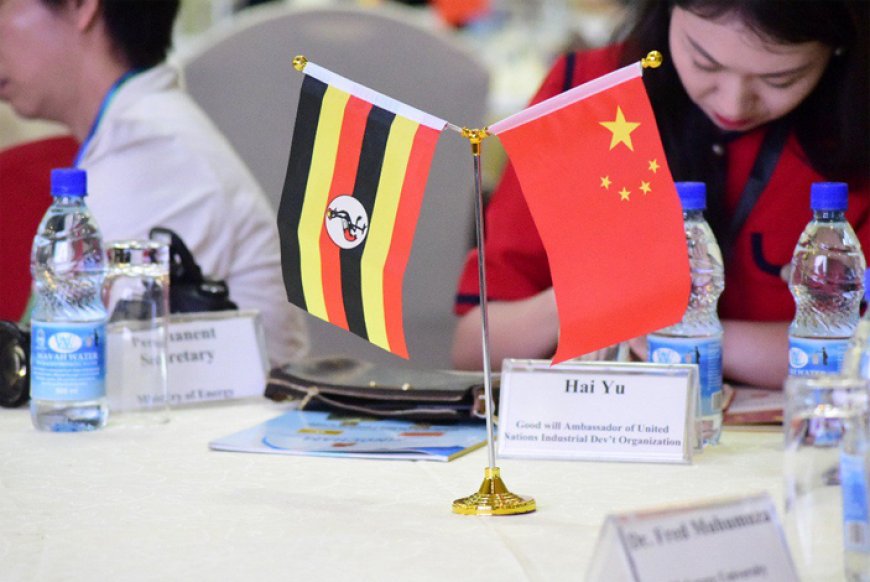What Chinas Focus on STEM Means for Ugandas Future
China's emphasis on STEM (Science, Technology, Engineering, and Mathematics) holds significant potential for Uganda’s future, especially in promoting economic growth, advancing technology, and building a skilled labor force. Through its support for Uganda’s ICT infrastructure and investments in key sectors such as agriculture and infrastructure, China is poised to play a vital role in accelerating Uganda’s economic progress and supporting the country’s Vision 2040 objectives.

What China's Focus on STEM Means for Uganda's Future explores the implica- tions of Uganda's increasing emphasis on Science, Technology, Engineering, and Mathematics (STEM) education, particularly in the context of its evolving relationship with China. This partnership has gained significance as Uganda seeks to address economic challenges, including high unemployment and skills gaps, while also striv- ing to transform into a middle-income nation. China's active involvement in infrastruc- ture development and education initiatives in Uganda presents both opportunities for economic advancement and challenges related to dependency on foreign aid.
The strategic focus on STEM education is viewed as essential for fostering innovation and empowering marginalized communities within Uganda. Various initiatives, such as the Raise the Bar program and collaborations with non-profits, aim to ensure equitable access to high-quality STEM education, thereby preparing a skilled work- force capable of contributing to the nation's economic growth. Furthermore, the involvement of the private sector and community-centric approaches underscores the importance of local engagement in driving educational reform and workforce development.
Notably, the partnership with China, highlighted by investments through the Belt and Road Initiative, serves as a critical driver of technological advancement in Uganda. While this collaboration has the potential to enhance educational outcomes and economic productivity, it also raises concerns regarding the long-term sustainability of such dependencies. Critics argue that reliance on Chinese investments could limit Uganda's autonomy in shaping its development trajectory and exacerbate issues related to debt sustainability.
In summary, Uganda's focus on STEM education, influenced by China's engagement, offers a promising path toward economic transformation and job creation. However, it necessitates a careful balance between leveraging foreign partnerships and fostering local capacity to ensure sustainable development and self-reliance in the future.
Historical Background
Since Uganda's independence in 1962, diplomatic relations between Uganda and China have been significant and evolving. China was among the first nations to recognize Uganda as an independent state, establishing a foundation for future cooperation. In 1971, Uganda was one of 76 countries that supported the restoration of UN membership for the People's Republic of China through Resolution 2758[1]. The relationship strengthened notably after Yoweri Museveni came to power in 1986, marked by a series of cultural cooperation agreements, which included the exchange of student and medical teams[1].
The two nations have cultivated a diplomatic rapport characterized by a policy of non-interference in each other's political affairs. This mutual respect has become particularly beneficial for Uganda, especially in light of Western criticism following the passage of the Uganda Anti-Homosexuality Act in 2014. In response to the Western backlash, which led to a withdrawal of economic aid from several countries, China stepped in to fill the gap by providing aid and infrastructure projects[1].
China's investments in Uganda have notably included extensive infrastructure projects, such as the Kampala-Entebbe highway, which is seen as a key initiative to enhance commerce and facilitate better access to regional markets[2]. Furthermore, in the financial year 2018/19, China emerged as a dominant Foreign Direct Investor in Uganda, accounting for 45.1% of total investments, valued at approximately $607 million[3]. The influence of China extends beyond infrastructure, as it has also be- come Uganda's second-largest trading partner, significantly impacting the country's economic landscape[3].
In education, the establishment of the Confucius Institute at Makerere University in 2014 marked a milestone in cultural exchange, promoting Chinese language studies and fostering closer ties between the two nations[4][5]. The ongoing educational ini- tiatives and collaborations reflect Uganda's strategic interest in engaging with China, particularly as the latter continues to focus on science, technology, engineering, and mathematics (STEM) education to enhance economic development in Uganda.
Current Focus on STEM
In recent years, there has been a notable shift in Uganda's educational landscape towards prioritizing STEM (Science, Technology, Engineering, and Mathematics) education, largely influenced by global trends and local initiatives. The growing focus on STEM is seen as essential for empowering marginalized communities, fostering innovation, and driving socio-economic development in Uganda[6][7].
Community-Centric Approaches
Global STEM initiatives are increasingly adopting community-focused strategies to enhance their effectiveness. These approaches emphasize partnerships among local schools, businesses, and research institutions, creating a collaborative environment that allows students to engage in real-world projects and internships[8]. One signifi- cant initiative that exemplifies this approach is the Raise the Bar: STEM Excellence for All Students program, which aims to ensure equitable access to high-quality STEM education across various educational levels, thereby preparing students for global competitiveness[8].
The Role of Non-Profits and Private Sector
Non-profit organizations and NGOs have become pivotal in delivering tailored STEM education programs, especially in underserved areas of Uganda. By working closely with local communities, these organizations can address the specific needs of marginalized groups and enhance educational outcomes[7]. Moreover, the private sector's engagement in promoting STEM education is crucial for cultivating a skilled workforce and fostering innovation. Through corporate social responsibility (CSR) ini- tiatives, mentorship opportunities, and scholarship programs, businesses contribute significantly to building an inclusive and dynamic society[7].
Enhancing Critical Skills and Innovation
The importance of STEM education in Uganda extends beyond mere academic achievement; it serves as a catalyst for developing critical thinking, problem-solving, and analytical skills among individuals. This educational focus empowers marginal- ized individuals to become active participants in their communities, driving innovation and sustainable development[6]. Furthermore, STEM literacy enables individuals to pursue entrepreneurial endeavors, fostering economic empowerment and commu- nity upliftment through locally relevant technologies and solutions[7].
Global Context and Emerging Trends
On a global scale, the distribution of STEM graduates has evolved, with emerging economies in Asia, particularly China and India, producing significant numbers of graduates in STEM fields[9]. This shift underscores the need for Uganda to enhance its STEM educational frameworks to remain competitive in the global market. The en- gagement with China, through initiatives such as the Belt and Road Initiative, exem- plifies a strategic partnership aimed at technological advancement and infrastructure development, further facilitating Uganda's focus on STEM education[10][11].
Implications for Uganda's Future
The focus on Science, Technology, Engineering, and Mathematics (STEM) education in Uganda has significant implications for the nation's future, particularly in relation to economic development and employment. As Uganda aims to transform into a middle-income country, leveraging the potential of STEM education can address existing challenges such as high unemployment rates and skills gaps within the labor market. The high cost of education and the predominance of a subsistence economy complicate these issues further, underscoring the necessity for strategic educational reforms that emphasize practical skills alongside theoretical knowledge[12][13].
Economic Transformation and Job Creation
Uganda's National Development Plan (NDP III) highlights the importance of indus- trialization, job creation, and export diversification[14]. Integrating STEM education into the curriculum is essential for producing a workforce that is not only highly employable but also capable of creating jobs. This shift towards a more practical education model aims to close the skills gap in industries critical to economic growth, including agriculture, tourism, and manufacturing[12][15]. By fostering a generation of skilled graduates, Uganda can enhance productivity and improve the quality of life for its citizens.
Infrastructure Development and Investment
The increasing involvement of Chinese investments in Uganda, particularly in infra- structure projects such as power generation, plays a pivotal role in the country's development[2]. With projects like the Isimba and Karuma dams, Uganda is set
to expand its electricity supply significantly, which is essential for both industrial
Overcoming Informal Sector Challenges
With approximately 80% of Uganda's workforce employed in the informal sector, the transition to a formalized economy poses challenges[15]. Effective implementation of STEM education can encourage innovation and entrepreneurship within this demographic, ultimately aiding in the formalization of businesses and improving
tax revenue collection. As noted, strengthening regulations and supporting informal businesses in their transition to the formal sector is crucial for fostering a more resilient economy[15].
Global Partnerships and Development Finance
Uganda's relationship with China presents both opportunities and challenges in terms of development financing[11]. By clearly defining national development goals and ensuring alignment with foreign investments, Uganda can maximize the benefits derived from Chinese partnerships. The commitment to sustainable economic trans- formation must include building local capacities in STEM fields, which would enhance the effectiveness of foreign investments and reduce dependency on external aid.
Measurable Outcomes
Impact of Educational Initiatives
China's focus on STEM education in Uganda has yielded significant measurable outcomes that are crucial for the country's future development. The Goal Project, for instance, has reported a 40% increase in higher education enrollment among at-risk young women between 2019 and 2023, indicating a growing access to
educational opportunities[16]. Additionally, this initiative has facilitated the awarding of scholarships to 200 at-risk girls, which has alleviated financial barriers and enabled these young women to pursue their desired fields of study[16].
Academic and Personal Development
The academic performance of mentees involved in The Goal Project has shown a marked improvement, with a 30% enhancement in grades reported during the same period[16]. Furthermore, participants have experienced notable personal develop- ment milestones, including a 45% increase in self-confidence and a 35% improve- ment in communication skills[16]. These outcomes underscore the transformative power of targeted mentorship in fostering both academic and life skills among disadvantaged youth.
Career Aspirations and Employment
The project has also significantly influenced the career aspirations of participan- ts, with over 60% now aspiring to careers in STEM fields, entrepreneurship, and education[16]. This shift represents a substantial increase from just 30% prior to
joining the program, reflecting a growing awareness of the opportunities available in these critical sectors. Moreover, over 70% of alumni have successfully secured stable employment or ventured into entrepreneurship, contributing to economic growth and enhancing women's representation in various professional fields[16].
Digital Skills and Economic Empowerment
In tandem with educational advancements, initiatives like Huawei's DigiTruck project have promoted digital inclusion in rural Uganda. This program aims to benefit over 10,000 individuals by providing ICT training that enhances skills necessary for economic empowerment[17]. Participants, such as small business owners, have reported transformative impacts on their businesses, indicating that improved digital literacy is vital for expanding commercial opportunities in underserved areas[17].
Future Outlook
The focus on Science, Technology, Engineering, and Mathematics (STEM) education is poised to significantly impact Uganda's future, particularly in the context of its ongoing development and modernization efforts. As global initiatives increasingly highlight the need for STEM competencies, Uganda stands at a crossroads where investment in education can transform its workforce and economic prospects[18][19].
Expanding Access to Quality Education
Investing in STEM education has the potential to enhance access to quality educa- tional resources in Uganda, especially for underserved communities. By collaborating with international organizations and leveraging partnerships, local schools can gain access to innovative curricula and technologies, which can level the playing field for students from diverse backgrounds[8]. Such initiatives, similar to the ASEI CODE program, aim to foster interest in STEM from an early age, thereby preparing the next generation for the demands of the modern economy[19].
Promoting Inclusive Growth
The integration of a demand-oriented approach to Technical and Vocational Educa- tion and Training (TVET) is crucial for aligning educational outcomes with market needs. Recommendations for a more inclusive approach to TVET delivery emphasize the importance of engaging the private sector and providing targeted programs that cultivate relevant skills[18][13]. This strategic engagement can lead to the develop- ment of a skilled workforce that not only meets the needs of local industries but also positions Uganda competitively on the global stage.
Addressing Challenges and Opportunities
While the potential for STEM education to catalyze economic growth is substantial, challenges remain. The need for significant investments in infrastructure and edu- cational frameworks is critical to ensure that the advancements in STEM translate into real-world applications and benefits[8]. Furthermore, creating an ecosystem that supports continuous learning and adapts to evolving technological landscapes is essential for sustaining growth[13].
References
[1] : China–Uganda relations - Wikipedia
[2] : China in Uganda: The Highs and Lows of the Belt and Road - ccpwatch
[3] : The Partnership of Development: Lessons from China-Uganda Relations
[4] : Mak Celebrates 10 Years of the Confucius Institute with Launch of Three ...
[5] : Mak Celebrates 10 Years of the Confucius Institute with Launch of Three ...
[6] : STEM Education | AI Skilling for Uganda’s Youth
[7] : Empowering Marginalized Communities in Uganda Through STEM ... - LinkedIn
[8] : Here’s How Global STEM Initiatives Can Impact Local Communities
[9] : The Global Distribution of STEM Graduates: Which Countries Lead the Way ... [10]: China, Uganda Forge Robust Partnership for Mutual Development
[11] : Strategies for Uganda to Harness China’s Development Finance
[12] : China’s engagements in Uganda and sustainable development
[13] : Integrating STEM Education in Uganda’s Higher Education to Produce ...
[14] : China-Uganda Engagement: An Afrocentric Analysis of the Relations
[15] : Uganda’s Vision 2040: What can we learn from China’s success
[16] : STEM – Youth & Women Opportunities Uganda - YWOU
[17] : China's collaboration propels Uganda's internet revolution: A tale of ...
[18] : (PDF) Chinese TVET Lessons for Uganda's Socio-Economic Growth










































